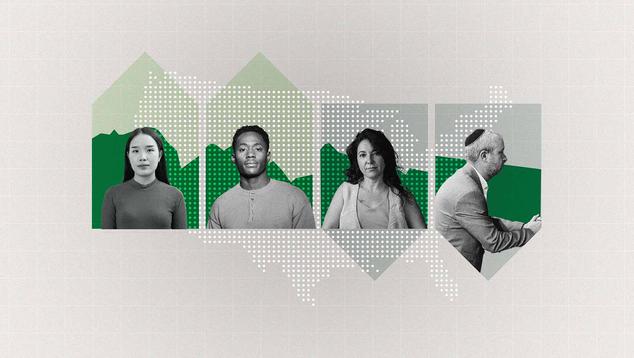Story Highlights
- More satisfied with treatment of Asian people, fewer with Jewish people
- Majorities rate relations between racial/ethnic groups positively
- Americans more optimistic about the future of Black-White relations
WASHINGTON, D.C. — Less than half of Americans are satisfied with the way immigrants and Black, Jewish, Arab and Hispanic people are treated in the U.S. Half are satisfied with the treatment of women, while majorities are comfortable with the way Asian and White people are treated.
These attitudes are mostly similar to what they were in 2021, when Gallup last asked the question. The meaningful changes include a decline in satisfaction with the way Jewish people are treated, from 51% to 42%, and a 10-percentage-point increase in satisfaction with the treatment of Asian people, nearly restoring it to 2020 levels.
The current results come from Gallup’s June 2-26 Minority Rights and Relations survey, which includes sufficiently large samples of Black and Hispanic Americans to report reliable estimates for those groups.
The 2021 survey was conducted after high-profile incidents of violence occurred against Asian people in the U.S., while the current survey comes at a time of heightened concern about antisemitism.
All three racial/ethnic groups represented in the survey, as well as the three major party groups, are more satisfied with the treatment of Asian people today than they were four years ago. Meanwhile, satisfaction with the treatment of Jewish people has declined since 2021 among White and Hispanic Americans, along with Republicans, independents and Democrats. There are too few Asian or Jewish respondents in the sample to reliably report their views of how their own group is treated.
Women and Black and Hispanic Americans are among the least satisfied with the treatment of their own groups, if not the least. For example, whereas 45% of non-Hispanic White Americans and 37% of Hispanic Americans are satisfied with the way Black people are treated in the U.S., only 24% of Black Americans feel the same. Additionally, 42% of women versus 58% of men are satisfied with societal treatment of women.
As is typically the case, Republicans are much more satisfied than Democrats and independents with how society treats certain groups. Democrats generally express the least satisfaction, except for how White people are treated (independents are slightly less satisfied than Democrats).
Satisfaction Levels Well Below 2001 Levels
From a longer-term perspective, Americans are much less happy with how key subgroups are treated than they were in the early 2000s. In fact, majorities of Americans in 2001 were satisfied with the way women, immigrants, and Asian, Black and Hispanic people were treated. Since then, satisfaction has declined by 22 points for immigrants, 20 points for women and Black people, 17 points for Hispanic people and 13 points for Asian people.
Gallup first asked about the treatment of Arab people in the U.S. in 2006. The trend for that measure has ranged more narrowly between 43% and 52% satisfied.
Satisfaction with the treatment of various population groups is down significantly over the past 25 years among White, Black and Hispanic Americans. The declines are greater among White Americans (averaging 18 points across the five population groups rated in surveys back to 2001) than among Black Americans (down an average of 7 points) and Hispanic Americans (down 11 points), mainly because White Americans were more satisfied with how groups were treated in the early 2000s.
Americans Generally Positive About Racial/Ethnic Group Relations
In addition to measuring perceptions of how societal groups are treated, the poll updated Americans’ views on relations between various pairs of specific racial/ethnic groups, such as Black and White Americans and Black and Hispanic Americans.
Majorities of Americans rate relations between racial/ethnic groups as being very or somewhat good, ranging from 53% saying this about Black-White relations to 76% for Asian-White relations.
Americans are more positive about Black-White and Asian-White relations today than they were in 2021. Their perceptions of other intergroup relations are essentially unchanged compared with four years ago.
The improvement in evaluations of Asian-White relations nearly brings it back to the levels Gallup measured in 2020, before the rise in anti-Asian violence. However, assessments of Asian-Black relations remain worse than in 2020.
All racial/ethnic and party groups, except for Hispanic Americans, view Asian-White and Black-White relations more positively today than they did in 2021.
Members of the major racial/ethnic groups rate most intergroup relations positively, although there are exceptions, including Black Americans’ assessments of Black-White relations (45% good) and Hispanic-White relations (38%). Less than half of Hispanic Americans (47%) also rate Black-White relations as good, compared with 57% of White Americans. Black and Hispanic Americans evaluate Black-Hispanic relations slightly better than White Americans do.
Republicans are more positive about relations between different racial/ethnic groups than Democrats and independents are, which is usually the case. Democrats are least positive about Black-White and Hispanic-White relations, with just over one-third describing each as good.
Longer-term trends in perceptions of racial/ethnic group relations show varied patterns. Compared with 2001, when the question was first asked, Americans now rate Black-Hispanic relations better, up to 67% from 49%, while they show worse ratings of Black-White relations (down to 53% from 63%) and Hispanic-White relations (down to 59% from 66%). U.S. adults’ evaluations of Asian-White relations are the same now as in 2001 but have been higher in intervening years.
Black, White and Hispanic Americans are all less likely to rate Black-White and Hispanic-White relations positively today than they were two decades ago. Improved perceptions of Black-Hispanic relations are primarily driven by White Americans’ views, which have improved to 64% positive from 42%, while Black and Hispanic Americans show no meaningful change since 2001.
Americans Optimistic About Future of Black-White Relations
A separate question that dates back to 1963 finds Americans retaining optimistic views about the long-term outlook for Black-White relations. Thirty-three percent, one of the lowest readings in the trend, believe relations between Black and White people will “always be a problem” for the U.S., while 62% think “a solution will eventually be worked out.”
Only in 2008, in a special poll conducted after Barack Obama was elected as the first Black U.S. president, have fewer Americans (30%) than now said Black-White relations would always be a problem.
In contrast, the peak in pessimism came in October 1995 after the O.J. Simpson murder trial verdict, the Million Man March and a major speech on race relations by then-President Bill Clinton.
Optimism about Black-White relations is not shared by Black Americans themselves, as 59% believe it will always be a problem, while 38% think a solution will eventually be worked out. Those attitudes contrast with the 30% of White Americans expecting racial strife to continue and 67% thinking a solution will eventually come. Hispanic Americans’ opinions nearly mirror those of White Americans (31% always a problem, 65% a solution will eventually be worked out).
With only a few exceptions in the trend, Black Americans have consistently expressed pessimism about Black-White relations. The exceptions, when Black Americans were more optimistic than pessimistic, came in 2020 during the public reckoning about racism after the George Floyd killing, in June 2008 during Obama’s presidential campaign and in the initial 1963 survey.
More White Americans have expressed optimism rather than pessimism since 2001.
Bottom Line
Americans are mostly dissatisfied with the way minority racial/ethnic groups are treated in the U.S., in contrast to their views at the start of the 21st century, when majorities were satisfied. In addition to specific high-profile incidents that have raised concerns about group treatment in the U.S. — including deadly incidents between White police officers and Black men and the “Me Too” movement against sexual harassment of women — the lower ratings in recent years may reflect Americans’ ongoing dissatisfaction with the state of the nation in general since 2005.
At the same time, Americans mostly perceive that racial/ethnic groups are getting along well. There has been some deterioration in these views since the early 2000s, including for Black-White relations and Hispanic-White relations, but also improved perceptions of Black-Hispanic relations. Americans overall remain optimistic about Black-White relations ceasing to be an issue in the future; however, Black Americans themselves are less inclined to predict this.
Stay up to date with the latest insights by following @Gallup on X and on Instagram.
Learn more about how the Gallup Poll Social Series works. View complete question responses and trends (PDF download).




